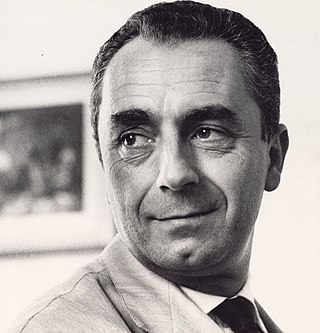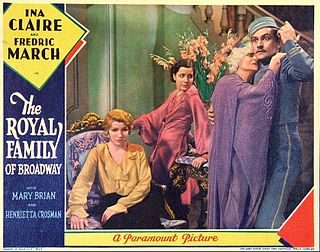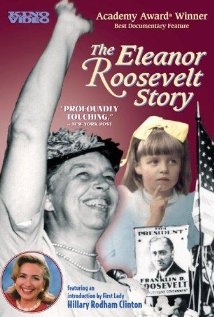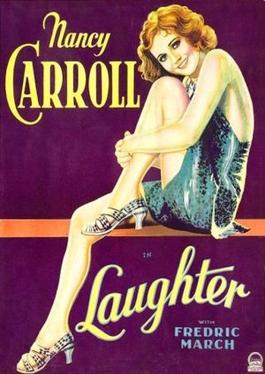Plot
This article needs a plot summary.(November 2023) |
| The Titan: Story of Michelangelo | |
|---|---|
| Directed by | Richard Lyford |
| Written by | Norman Borisoff |
| Produced by | Ralph Alswang Robert J. Flaherty Robert Snyder |
| Narrated by | Fredric March |
| Cinematography | Harry Ringger |
| Edited by | Richard Lyford |
| Distributed by | Classic Pictures |
Release date |
|
Running time | 70 minutes |
| Country | Germany |
| Language | English |
The Titan: Story of Michelangelo is a 1950 German documentary film about the painter and sculptor Michelangelo. It won the Academy Award for Best Documentary Feature. [1]
The film was a re-edited version of a German/Swiss film of 1938 originally titled Michelangelo: Life of a Titan, directed by Curt Oertel. The re-edited version featured a new English narration by Fredric March and a musical score onto a shorter edit of the existing film. The new credits include Richard Lyford as director and Robert Snyder as producer. The film was edited by Lyford. The Academy Film Archive preserved The Titan in 2005. [2]
This article needs a plot summary.(November 2023) |

Robert Joseph Flaherty, was an American filmmaker who directed and produced the first commercially successful feature-length documentary film, Nanook of the North (1922). The film made his reputation and nothing in his later life fully equaled its success, although he continued the development of this new genre of narrative documentary with Moana (1926), set in the South Seas, and Man of Aran (1934), filmed in Ireland's Aran Islands. Flaherty is considered the father of both the documentary and the ethnographic film.

Michelangelo Antonioni was an Italian director and filmmaker. He is best known for his "trilogy on modernity and its discontents"—L'Avventura (1960), La Notte (1961), and L'Eclisse (1962)—as well as the English-language film Blowup (1966). His films have been described as "enigmatic and intricate mood pieces" that feature elusive plots, striking visual composition, and a preoccupation with modern landscapes. His work substantially influenced subsequent art cinema. Antonioni received numerous awards and nominations throughout his career, being the only director to have won the Palme d'Or, the Golden Lion, the Golden Bear and the Golden Leopard.

The Royal Family of Broadway is a 1930 American pre-Code comedy film directed by George Cukor and Cyril Gardner and released by Paramount Pictures. The screenplay was adapted by Herman J. Mankiewicz and Gertrude Purcell from the play The Royal Family by Edna Ferber and George S. Kaufman. It stars Ina Claire, Fredric March, Mary Brian, Henrietta Crosman, Arnold Korff, and Frank Conroy. It was shot at the Astoria Studios in New York.

Raymond Frederick Harryhausen was an American-British animator and special effects creator who created a form of stop motion model animation known as "Dynamation". His works include the animation for Mighty Joe Young (1949) with his mentor Willis H. O'Brien ; his first color film, The 7th Voyage of Sinbad (1958); and Jason and the Argonauts (1963), which featured a sword fight with seven skeleton warriors. His last film was Clash of the Titans (1981), after which he retired.
A feature film or feature-length film, also called a theatrical film, is a narrative film with a running time long enough to be considered the principal or sole presentation in a commercial entertainment program. The term feature film originally referred to the main, full-length film in a cinema program that included a short film and often a newsreel. Matinee programs, especially in the US and Canada, in general, also included cartoons, at least one weekly serial and, typically, a second feature-length film on weekends.

Final Cut Pro is a professional non-linear video-editing application initially developed by Macromedia, and, since 1998, by Apple as part of its pro apps collection. Final Cut Pro allows users to import, edit, and process video footage, and output it to a wide variety of formats.

William Augustus Wellman was an American film director, producer, screenwriter, actor and military pilot. He was known for his work in crime, adventure, and action genre films, often focusing on aviation themes, a particular passion. He also directed several well-regarded satirical comedies. His 1927 film, Wings, was the first film to win an Academy Award for Best Picture at the 1st Academy Awards ceremony.

Albert Maysles and his brother David Maysles were an American documentary filmmaking team known for their work in the Direct Cinema style. Their best-known films include Salesman (1969), Gimme Shelter (1970) and Grey Gardens (1975).

The Anderson Platoon is a documentary feature by Pierre Schoendoerffer about the Vietnam War, named after the leader of the platoon - Lieutenant Joseph B. Anderson - with which Schoendeorffer was embedded. Two decades later, a sequel was released as Reminiscence.
Chris Terrio is an American screenwriter and film director. He is best known for writing the screenplay for the 2012 film Argo, for which he won the Academy Award for Best Adapted Screenplay. Terrio also won the Writers Guild Award for Best Adapted Screenplay of 2012 and was nominated for Golden Globe Award for Best Screenplay, a BAFTA, and the 2013 Los Angeles Film Critics Award for Best Adapted Screenplay for this work.
The 20th Academy Awards were held on March 20, 1948, to honor the films of 1947. It is notable for being the last Oscars until 2005 in which no film won more than three awards.

The Eleanor Roosevelt Story is a 1965 American biographical documentary film directed by Richard Kaplan.

Laughter is a 1930 American pre-Code comedy film directed by Harry d'Abbadie d'Arrast and starring Nancy Carroll, Fredric March and Frank Morgan. It was shot at the Astoria Studios in New York.
Jay Cassidy is an American film editor with dozens of credits since 1978.
Ralph Alswang was an American theatre and film director, designer, and producer. He designed scenery, lighting, and costumes for nearly 100 Broadway productions. He also designed venues such as the George Gershwin Theatre.

Jeffrey Friedman is an American filmmaker. In 2021, he and Rob Epstein won a Grammy Award for their work on the documentary film Linda Ronstadt: The Sound of My Voice
Anya Verkhovskaya is a Moscow-born consultant, chief operating officer, Expert Witness, and Human Rights Activist. She is the founder of Class Experts Group, LLC. and former Managing Director of DRRT. Verkhovskaya currently serves as the President of Class Experts Group, LLC.
Richard Hoover Lyford was an American filmmaker.

Robert Snyder was a documentary filmmaker who won an Academy Award in 1950 as producer of The Titan: Story of Michelangelo.
Kim Roberts, A.C.E., is an American filmmaker who has worked primarily on documentaries as a film editor and writer. Roberts has a master's degree in documentary film production from Stanford University (1996). Her first credit as an editor was for Long Night's Journey into Day (2000), which was directed by Deborah Hoffmann and Frances Reid and that was nominated for the Academy Award for Best Documentary Feature. She was credited as both an editor and writer for Great Wall Across the Yangtze (2000), which was directed by Ellen Perry. Her work since then and several of her honors are sketched in the filmography below. Roberts was featured in a New York Times article on film editing in 2012. She has been selected for membership in the American Cinema Editors, which entitles editors to append "A.C.E." to their film credits.